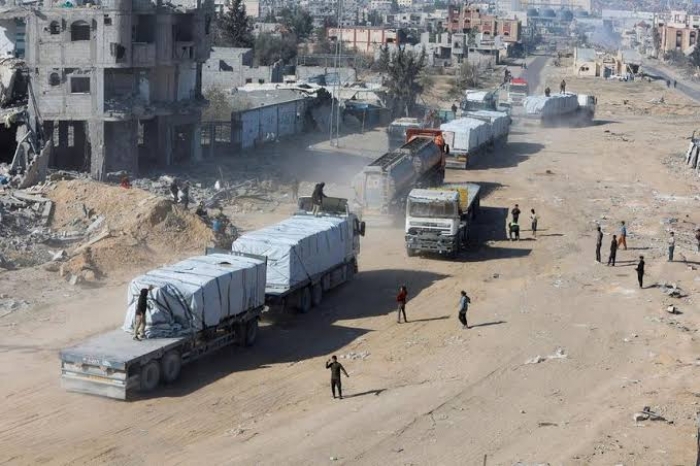More than 2,400 aid trucks enter Gaza under truce, UN says no big looting issues
Nearly 900 humanitarian aid trucks entered the Gaza Strip on Tuesday, the third day of a ceasefire between Israel and Palestinian militants Hamas, as a senior U.N. official said so far there had been no apparent law-and-order issues.
The latest arrivals bring the three-day total to more than 2,400 trucks entering the enclave.
Throughout the 15-month war, the U.N. has described its humanitarian operation as opportunistic - facing problems with Israel's military operation, access restrictions by Israel into and throughout Gaza and more recently looting by armed gangs.
Muhannad Hadi, the top U.N. aid official for Gaza and the West Bank, said there had been minor incidents of looting in the past three days, but "not like before."
"It's not organized crime. Kids jumped on some trucks trying to take food baskets. There were some other people (who) tried to take some bottled water," he told reporters after visiting the Palestinian enclave on Tuesday.
"Hopefully within few days this will all disappear once the people of Gaza realize that we will have aid enough for everybody."
The U.N. Office for the Coordination of Humanitarian Affairs said 897 aid trucks entered the Gaza Strip on Tuesday, citing information it received from Israel and the guarantors for the ceasefire agreement - the United States, Egypt and Qatar.
This compares with 630 on Sunday and 915 on Monday. The truce deal requires at least 600 truckloads of aid to be allowed into Gaza every day of the initial six-week ceasefire, including 50 carrying fuel. Half of those trucks are supposed to go to Gaza's north, where experts have warned famine is imminent.
Hadi warned that problems were likely to arise: "Let's not assume that because there is a ceasefire life is going to be rosy and our work is going to be a walk in the park."
He said the aid operation faced logistical problems because the road network within Gaza was destroyed, adding that the movement of people with the enclave was also a complicating factor.
OCHA said on Tuesday that humanitarian priorities in Gaza include food assistance, opening bakeries, providing healthcare, restocking hospitals, repairing water networks, bringing material to repair shelters, and reuniting families.
Reuters

































































